In a significant legal confrontation within the New York real estate sector, Charles Cohen, a prominent mogul, has found himself at a tumultuous crossroads. The ongoing battle against Fortress Credit Corp. has escalated following a ruling from the New York State Supreme Court. This judgment holds Cohen accountable for a personal loan guarantee worth $187 million connected to a larger financial structure, the implications of which reverberate throughout the real estate market, especially as an auction of vital assets approaches.
The crux of the dispute lies in a default on a staggering $530 million loan that was secured against an assortment of properties, including the well-known Landmark Theaters and the British arthouse chain Curzon. Fortress’s legal action initiated last spring alleges that Cohen’s failure to uphold his financial responsibilities triggered the need for an auction. Speculations suggest this could culminate in one of the most expansive property sales recorded in New York, as governed by the Uniform Commercial Code, showcasing the extent of the financial complexities Cohen is grappling with.
The court has tentatively slated an auction for these coveted assets on November 8. This event could not only signify an important moment for Cohen but also reshape ownership structures within the New York real estate landscape, providing keen insight into how such high-stakes dealings are navigated under pressure.
Recently, the judge’s ruling extended further by affirming Cohen’s responsibility for the aforementioned $187 million guarantee, contingent upon the outcomes of the impending auction. In a strategic move, Cohen has now filed a notice of appeal to contest this judgment. This appeal will seek to challenge the court’s previous decision, particularly questioning whether adequate grounds existed for dismissing Cohen’s initial motion, and the circumstances surrounding the alleged default.
Cohen’s legal team contends that an essential exchange of emails indicates a prior agreement to extend the loan, a point that could potentially shift the legal dynamics of this case. However, the counterargument from Fortress asserts that these communications were both ambiguous and non-binding, thus solidifying the court’s stance.
Cohen’s quest for justice is not purely a personal concern; it reflects broader issues concerning financial responsibility in high-stakes ventures within the real estate domain. The outcome of this legal battle will not only affect Cohen and Fortress but could set precedents impacting future loan agreements and negotiations in New York’s burgeoning real estate market.
In an atmosphere where real estate transactions often involve millions of dollars, the clarity and enforceability of loan guarantees become paramount. This case illustrates the potential pitfalls and complexities that come with large personal and corporate financial commitments, shedding light on the pitfalls that even established moguls may encounter.
Overall, as Cohen navigates this intricate legal labyrinth, the implications of this case remind stakeholders within the real estate sector to engage in diligent contract management and robust legal oversight. The public’s eyes will remain fixed on the developments of this case as it unfolds, highlighting the ongoing volatility in New York’s dynamic property landscape.
